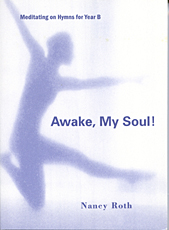About the Series:
Christian hymns that have been sung over and over down through the years find a home in our hearts. In the oddest moments we begin humming their tunes and remembering their words. In moments of happiness, we use them to express joy and praise. In time of pain and sorrow, they bring us solace. These songs link us to congregations from centuries ago, to the communities we have sung with at other times in our lives, and to Christians around the world today who are singing the same hymns in different languages.
Nancy Roth, an Episcopal priest, educator, and spiritual director has written a series of three books on using hymns for meditation. These handy resources are designed to be used in conjunction with Poems of Grace, the text-only version of The Hymnal 1982. "When we take the time to look through the 'window' a hymn provides, it does not remain a one-way glass," Roth writes. "Gradually, if we take the time, the hymn begins to speak to us as well. It addresses us from across time and space. It begins to speak to our spirits. Through the hymn, we begin to hear the voice of God, and the hymn, in turn, becomes our prayer."
Roth presents a brief historical look at the hymn and its author along with a meditation that can be used as a spur to personal devotion or as a study program in Christian education. She suggests a meditative pattern for processing the hymns by preparing, picturing, pondering, gathering, and singing. The hymns chosen follow the church year, beginning with Advent and including all Sundays and major Holy Days.
About this volume:
This volume has assessments of hymns by John Dryden, Georgia Harkness, George Herbert, Oliver Wendell Holmes, Charles Kingsley, John Milton, Thomas a Kempis, John Wesley, and many others. Roth describes the joy in the text of "Come, Thou Fount of Every Blessing" as being as "effervescent as a champagne fountain," then adds that author Robert Robinson's "praise of God flowed not from a life of easy success, but from a life which had been difficult." She wonders if perhaps an easy life might be an impediment to spiritual growth: "If we never know discomfort, how will we learn to deal with real suffering when it comes our way?"
"Guide me, O thou great Jehovah" becomes a song for pilgrims when Roth points out that its author, William Williams of Wales, criss-crossed that difficult and confusing terrain as an itinerant evangelist. After providing a history of the Christmas hymn "Lo, how a Rose e'er blooming" and of garden roses, she notes: "Thinking about roses in winter, like thinking about Mary's gift to the dark world, heals the human spirit, yearning in midwinter for the beauties of the summer garden."
